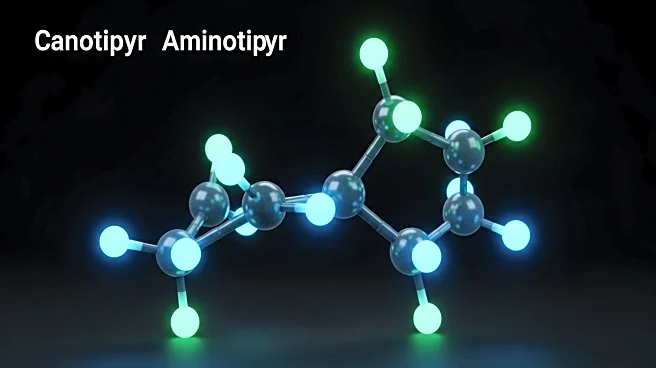What's Happening?
The International Organization for Standardization (ISO) has approved the common name 'aminotipyr' for a new fungicide developed by Qingdao KingAgroot Chemical Compound Co. The approval was finalized on October 1, 2025, and the name will be included in the upcoming edition of ISO 1750, which lists preferred and common names for chemical compounds. The fungicide, identified by its chemical structure [4-[(5-methyl-2-thiazolyl)oxy]phenyl]methyl 2-amino-6-methyl-3-pyridinecarboxylate, has not faced any objections regarding its naming, allowing for its seamless integration into the ISO standards. This development marks a significant step for Qingdao KingAgroot in establishing its product within the global agricultural market.
Why It's Important?
The approval of 'aminotipyr' as a common name by ISO is crucial for Qingdao KingAgroot Chemical Compound Co., as it facilitates international recognition and standardization of their fungicide. This can enhance the company's marketability and credibility, potentially leading to increased adoption and sales across global markets. For the agricultural industry, the introduction of new fungicides like aminotipyr can offer more options for crop protection, potentially improving yield and reducing losses due to fungal diseases. The standardization also aids in regulatory compliance and eases the process for farmers and distributors to understand and utilize the product effectively.
What's Next?
With the ISO approval, Qingdao KingAgroot Chemical Compound Co. is likely to focus on marketing and distribution strategies to introduce aminotipyr to international markets. The company may engage in partnerships or collaborations to expand its reach and ensure the fungicide is accessible to farmers worldwide. Additionally, regulatory bodies in various countries may begin evaluating aminotipyr for local approval, which could influence its availability and usage in different regions. Stakeholders in the agricultural sector will be watching closely to see how this new fungicide performs in real-world applications and its impact on crop protection strategies.
Beyond the Headlines
The approval of aminotipyr highlights the ongoing innovation within the agricultural chemical industry, reflecting a broader trend towards developing more effective and environmentally friendly crop protection solutions. As new compounds are introduced, there is a growing emphasis on sustainability and reducing the ecological footprint of agricultural practices. This development may also prompt discussions on the balance between chemical use and organic farming methods, as stakeholders seek to optimize food production while minimizing environmental impact.











